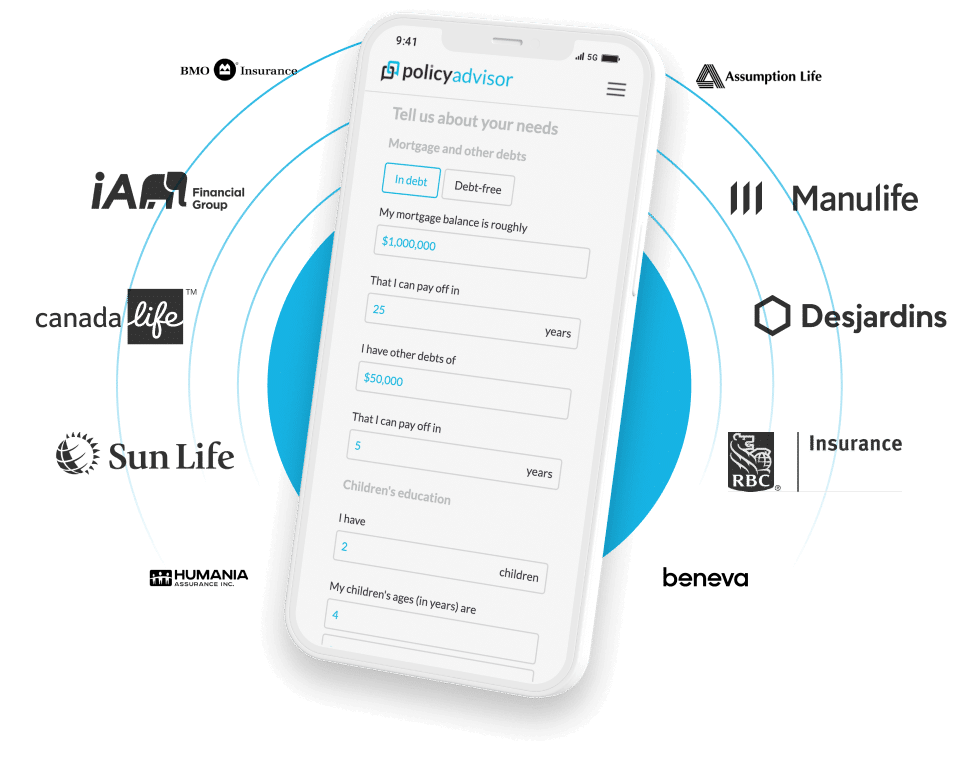
You know that sinking feeling when your boss pulls you into an unexpected 1:1 call?
Chances are you probably won’t be fired. But wouldn’t it be nice to have some sort of insurance product that can help make sure your bills would be paid even if you were? It would certainly make those 1:1 notifications a little less stress-inducing.
Introducing: job loss insurance.
It’s not a perfect solution, and it isn’t always worth it for everyone. But with most people financially treading water in today’s economy, losing income is the ultimate nightmare. Read on to learn how this product may help you protect your family and make sure your loan payments are covered, no matter what.
What is job loss insurance?
Job loss insurance is designed to cover your monthly payments in the event that you lose your job. In general, it’s offered as an add-on to other credit protection products, like mortgage insurance or credit card loan protection.
It may cover:
- Car loan payments
- Minimum credit card payments
- Mortgage payments
Creditors sell this product to ensure they keep receiving their monthly payments even if you become unemployed. But there can be a benefit for you too. Job loss insurance can help keep you on top of outstanding balances on your loans so you don’t ruin your credit while you’re in between jobs.
| If you lost your job tomorrow, would your savings cover all of your bills?
According to Statistics Canada, the average savings rate of household income is 5.1%. That means most Canadians are only saving a tiny fraction of their salary. So, chances are, your savings wouldn’t be enough to cover your bills. But even if it could, would you really want to dip into your savings just to make ends meet? |
What are the main types of job loss insurance?
Job loss insurance is rarely offered as a stand-alone product, so there aren’t exactly different “types” of job loss insurance. Rather, job loss insurance is offered as an add-on to creditor insurance products such as:
Mortgage Payment Protection Insurance: This type of insurance is designed to cover your mortgage payments in case something happens to you — such as if you lose your job. It helps to ensure that you can keep your home even if you’re temporarily unemployed. There is also mortgage life insurance, which pays off your mortgage if you pass away unexpectedly.
Credit Card Payment Protection: Credit card payment protection insurance covers your minimum monthly credit card payments if you lose your job, become disabled, etc. This can protect your credit score as it allows you to keep on track with your payments.
Loan Payment Protection Insurance: Similar to mortgage protection, loan payment protection insurance covers various types of loans, such as personal loans and auto loans. It helps you make loan payments when you’re out of work. It’s usually sold to you when you apply for your car loan.
| What is employment insurance?
Employment Insurance (EI) is a government-provided program offered in Canada. It offers temporary financial assistance to individuals who have lost their jobs through no fault of their own. It is typically funded through payroll taxes by you and your employer. There are certain eligibility requirements, including having worked a certain number of hours before you can claim benefits. Usually, to start getting job loss insurance benefits, you need to have already put in a claim with EI. |
There are other types of benefits you can receive if you are unable to work due to injury or illness. These are sometimes confused with job loss insurance products. However, these types of insurance products provide income replacement if you cannot work due to injury or illness—not termination.
Short-Term Disability Insurance: Short-term disability insurance provides income replacement if you’re temporarily unable to work due to a covered disability, injury, or illness. It can act as a bridge to cover your financial needs during short-term unemployment due to medical reasons. Usually, this coverage lasts a few weeks to a few months.
Long-Term Disability Insurance: Unlike short-term disability insurance, long-term disability insurance covers extended periods of disability and may continue to provide income replacement if you can’t return to work for an extended time. Usually, this coverage lasts a few months to years, depending on your circumstances.
Critical Illness Insurance: While it’s not income replacement in the traditional sense, critical illness insurance can provide a lump-sum payment if you are diagnosed with a severe illness or condition. This can help cover medical expenses and other financial obligations during a period of illness when you may not be able to work.
What is the difference between disability insurance and job loss insurance?
Sometimes, people get disability insurance and job loss insurance confused. Ultimately, they’re both types of insurance designed to replace your income or help cover what your income usually pays for, but there are a couple of differences in the details of what they cover and when.
Job loss insurance: An add-on product that covers your monthly payments for outstanding loans (mortgage, car, personal, credit card) if you are fired or terminated (or sometimes if you quit). This product assumes you cannot return to your previous job.
Disability insurance: Provides income replacement (up to a certain percentage) if you are ill, injured, or disabled. This product assumes that you will go back to work in some capacity at some point, once you have recovered.
In some cases, you have disability insurance through your employer benefits plan already and the premiums are either partially or totally covered by your employer. With job loss insurance, you buy this on your own as personal income protection on top of creditor insurance—it is not offered by your employer.
Some creditor insurance offers disability coverage in combination with job loss insurance, especially for bigger loans like mortgages. If you still have the job but can’t work, disability insurance applies. But if you’re let go and can’t work, then job loss insurance applies. The financial institution likes to sell this combo product because it means they’ll get their loan payment no matter what happens to you.
What does job loss insurance cover?
Job loss insurance covers specific financial obligations and provides benefits when you experience involuntary unemployment or job loss. As noted earlier in this article, job loss insurance can cover things like:
- Your mortgage payment
- Your credit card payment
- Your loan payments
- Your insurance premiums
You should pay attention to where you buy this insurance from because that might determine what will be covered. For example, if you buy this coverage through your credit card, only your minimum credit card payments may be covered. It won’t cover your other bills or anything else you pay for with your income.
Additionally, some job loss protection coverage is set at a fixed amount. This is particularly important to watch out for with products like mortgages, which might have varying payment amounts depending on whether your mortgage is fixed or floating and what your amortization period is. If the job loss benefit doesn’t cover all of your current mortgage payment, you’ll have to come up with the rest.
| IMPORTANT
Most job loss insurance policies have a 30-to-60-day waiting period. This means you won’t start getting benefits until 30-60 days after your last day at work. You’ll have to find a way to cover your bills in the meantime. You may also have to wait until EI requirements are satisfied, which could take weeks for approval. Additionally, most policies will only provide up to 6 months of coverage at a time or 12 months of lifetime coverage. |
Eligibility for job loss insurance
To qualify for job loss insurance, there is a strict set of eligibility requirements. General eligibility rules can include:
- You must have worked at least 6 months at your current job
- You must be working full-time (20 hours per week minimum)
- You must be between 18 and 70 years old
Those who are self-employed, retired, working part-time, or working on temporary contracts generally cannot get job loss insurance.
Additional requirements may be that you…
- Are not aware of your pending unemployment (no knowledge of impending layoffs or legal strikes)
- Enroll in Canada’s EI program before you receive your secondary job loss insurance coverage
- Satisfy a 30-60 day waiting period where you must cover your bills before benefits start
- Must not receive income anywhere else (such as secondary jobs, side hustles, casual work, etc.)
How much does job loss insurance cost?
The cost of your job loss insurance will depend on your age and the total amount of coverage you are looking for. The premium cost is usually calculated by taking your monthly payment amount (for your mortgage, credit card, or loan) and multiplying it by the rate you’re eligible for based on your age. As with most types of insurance, the price of loan insurance goes up as you get older.
| Example
You owe $660,000 on your mortgage at the time of your application for job loss insurance. Your monthly mortgage payment is $2,000/month. The insurance company charges $2.25 for every $100 of monthly payments owed. $2,000/month ÷ $100 = 20 Your monthly premium for job loss protection for your mortgage payments would be $45 per month. |
What do you need to claim with job loss insurance?
Each insurance company will have specific requirements for the documentation required to receive a job loss insurance benefit. But, in general, you might need:
- Record of Employment (ROE)
- Proof of Employment Insurance (EI) or strike pay (Union Letter)
- Proof of unemployment benefits or copy of the Service Canada letter regarding your severance package
- Any additional claims forms required by the insurance provider
You can find your record of employment on the Service Canada website.
Is job loss insurance worth it?
No, job loss insurance is often not worth it and we cannot recommend it. But there may be some exceptions. Many Canadians don’t have enough savings to cover their expenses for a few months if they suddenly lose their job. In this case, job loss insurance could be a way to ensure bills get paid if they don’t have income for a while.
However, there are many downsides to job loss insurance:
There’s a waiting period: Most job loss insurance products require that you are out of work for at least 30-60 days before they will start paying benefits. This means you still have to cover your bills between now and then with your savings.
There’s a maximum payment period: Most policies have a maximum benefit period of six months, meaning if you’re out of work for longer then you’re out of luck.
There are EI requirements: Many providers require that you’re enrolled in Canada’s Employment Insurance program, which may take weeks to process.
You may not be covered for termination for cause: Some providers may not provide coverage if you are fired for cause.
| Fired for cause
Being fired for cause means that you were fired for a serious reason. This could be company theft, malpractice, or negligence. When you are fired for cause, you are not eligible for EI, severance, or notice of termination and therefore not eligible for job loss insurance. Fired without cause If you are let go without cause, it means your employer has fired you for a less serious reason. Reasons could include company restructuring or because the company no longer requires you do to that job. |
You may not be covered if you quit: Some providers will give you benefits if you quit, but that isn’t always the case.
It only covers full-time workers: If you are self-employed, work on contract, or work seasonally, you are not eligible for job loss protection.
It can be expensive: Job loss protection coverage, like mortgage insurance, is often based on your total debt. This can add up, depending on how much the debt is covering.
The bottom line: Job loss insurance is often too expensive for the amount of coverage you get, and not really worth it overall.
Who sells job loss insurance?
Almost all financial institutions and creditors will offer some form of job loss or loan protection insurance. In some cases, they only offer coverage for the loan in case you pass away or become severely disabled—not if you lose your job. Always check the policy wording to see if coverage for job loss is offered.
Some financial institutions that sell job loss insurance products include:
- Scotiabank
- BMO
- Desjardins
- Manulife
- RBC
- CIBC
While these big financial institutions are reputable and have great insurance products, we still don’t recommend job loss insurance in general. Instead, if you’re looking for a cost-effective way to protect yourself financially, there are other insurance products we would recommend first, such as critical illness insurance or disability insurance.
Many people don’t know what they would do if an injury or illness prevented them from working. If you’re mostly worried about not being able to work due to injury or illness (which might be more likely than randomly getting fired), we would recommend short and long-term disability insurance.
| Did you know? One in three workers between ages 30-64 will experience a disability for longer than 90 days. |
The benefits of disability insurance can be used for anything your income usually covers, like daycare, groceries, and more. Plus, disability insurance usually costs about 1-3% of your annual salary, which can be much lower than the cost of job loss insurance.
Get a quote for job loss insurance
While PolicyAdvisor does not provide job loss insurance, we work with over 30 great insurance companies and financial institutions that may be able to provide this product for you. Although, we’d like to stress the importance of assessing your insurance needs before you sign on the dotted line. Have a quick chat with one of our expert insurance advisors. We can help you find the right insurance product for your financial goals within your budget. Book a call today!
Job loss insurance, also known as income insurance, helps safeguard your financial stability in the event that you are fired by covering essential payments like mortgages, credit cards, and loans. Eligibility for job loss insurance typically requires full-time employment and enrollment in Canada’s EI program. Costs vary based on age and coverage amount. It is not a recommended product but it could be a helpful option for people who do not have an emergency fund.


 1-888-601-9980
1-888-601-9980


